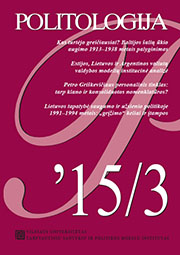LIETUVOS TAPATYBĖ SAUGUMO IR UŽSIENIO POLITIKOJE 1991–1994 METAIS: „GRĮŽIMO“ KELIAI IR ĮTAMPOS
LITHUANIAN IDENTITY IN THE CONTEXT OF FOREIGN AND SECURITY POLICY IN 1991–1994: THE WAYS OF “RETURNING” AND TENSIONS
Author(s): Justinas LingevičiusSubject(s): Politics / Political Sciences, Politics, International relations/trade
Published by: Vilniaus universiteto leidykla & VU Tarptautinių santykių ir politikos mokslų institutas
Summary/Abstract: The article analyses how the reconstituted Republic of Lithuania constructed its identity in the context of foreign and security policy. The main purpose of this study is to find out how Lithuanian identity was constructed in 1991–1994 and what kind of tensions unfolded regarding the integration processes. The study relies on the premise that the internally formed identity of a country is the main aspect that provides insights into foreign and security policy, represents relations with other countries and describes self-positioning in international politics. Therefore, it is important to analyze how this identity was constructed.Post-structuralists argue that identity, which is the main concept of post-structuralistic analysis, is understood as discursive, political, social, and relational (the distinction between the Self and the Other). Therefore, the relation between identity and foreign and security policy is constitutive, this identity is not given and stable but varies and transforms according to foreign and security policies. The discourse analysis is used as a method and means to identify the socially constructed reality. By discourse we refer to spoken and written texts. Therefore, the basic material for research is 100 articles in which politicians, commentators, intellectuals, etc. have been analyzing the Lithuanian foreign and security policy from 1991 to 1994. The texts are taken from three Lithuanian newspapers: “Lietuvos rytas”, “Lietuvos aidas”, and “Atgimimas”. The results are divided into two dimensions: Western dimension (addressing Europe in general and the European Union) and regional dimension (addressing Northern Europe, the Baltic region, and Central Europe). Several observations could be made. European representations have been dominant in the discourse. There have been a few different aspects with regard to this. Lithuania has been perceived as belonging to the same civilization as Europe, and Europe has been understood as the most important security guarantor. At the same time, however, Lithuania has also regarded Europe with distrust and felt inferior. Therefore, willingness to be integrated into Western security organizations, on the one hand, and fears and intention to primarily formulate national identity, on the other, have formed tensions between these two visions. Three regions have been understood merely as means to reach the strategic purposes and get integrated into Europe. Northern Europe has been generally perceived as a friendly, well-developed and reliable region. Therefore, this partnership could have contributed to guaranteeing Lithuania’s security and integration. However, there has been no common historical or cultural background between Lithuania and Northern Europe. For this reason, Northern Europe has existed as a stranger in the context of identity. Conversely, there have been a few cohesive aspects between Lithuania and Central Europe, but Central Europe has been represented as unreliable in the terms of security. Compared to Northern or Central Europe, only the Baltic region has been understood in greater depth. However, the main questions about the core of the Baltic identity have not been still answered, but the common Baltic region has been seen as instrumental and useful for integration processes. This research shows the complexity of Lithuanian identity and the possible roots of nowadays’ tendencies. Despite the fact that Lithuanian identity has been based on orientation towards Europe, there have been other dimensions found in public discussions between 1991 and 1994. Finally, Lithuanian identity has laid on the limited pro-European background with a few additional fragments. Finally, all subjects, such as different regions, have been understood as strange Others.
Journal: Politologija
- Issue Year: 2015
- Issue No: 3 (79)
- Page Range: 127-162
- Page Count: 36
- Language: Lithuanian

